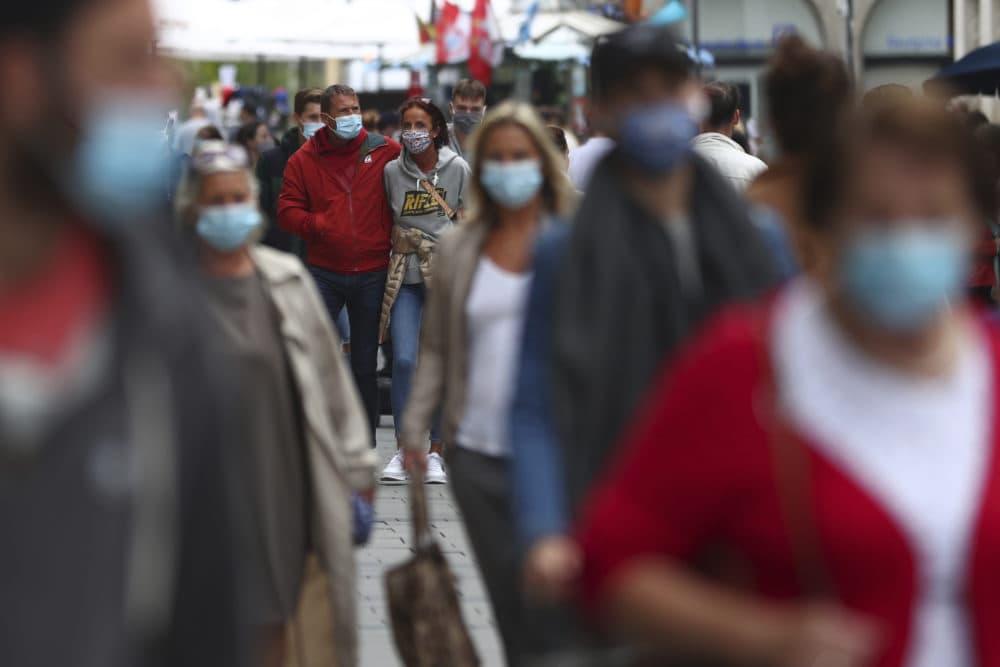Advertisement
How COVID-19 Variants Affect Herd Immunity

The Biden administration has announced an agreement with an Australian company to bring the first at-home rapid COVID-19 test available without a prescription to the United States.
The news comes as COVID-19 hospitalizations continue to decline, though the number of people in the hospital is still higher than it was during last summer's surge.
Dr. Carlos del Rio, executive associate dean of the Emory School of Medicine, says having accessible at-home COVID-19 testing is vital to reinvigorating the economy and reopening schools and businesses.
Imagine if you had access to a cheap, at-home test if you felt under the weather on a day you had to go into work, he says. Giving people the ability to regularly check themselves could make a difference in combating the spread, he says.
Even with the vaccine rollout underway, del Rio says the U.S. is still “coming down from [Mount] Everest” in terms of peak hospitalizations and deaths from COVID-19.
“And coming down from Everest,” he says, “you can still get killed on the way down.”
Interview Highlights
On the new coronavirus variants
“Some of the variants are more transmissible, which is the case of the U.K. variant, and that's one that we obviously are following very closely and are very concerned about. Because the number of cases, even though it's not more severe, if the number of cases goes up than the number of people hospitalized and dead would also go up just at a similar rate of disease-causing and death.”
“But I'm also very concerned about the South African variant, which, as you know, last week was noticed for the first time ... in South Carolina. And that variant actually has two characteristics that I worry about. Number one, it's more resistant to the monoclonal antibodies, those therapies that we have available. But number two, when we [saw] the results last week from the Novavax trial in South Africa, it did not seem like the vaccine was that effective at protecting against that strain. That to me is really the concern — are we coming up with a strain that our current vaccines are not working? And companies are already working on doing modifications to the vaccines to take care of that. ... We cannot just continue to be doing modifications to the vaccine every time a new variant appears. So I'm really worried that we have to address this.”
Advertisement
On if someone who has received the Pfizer or Moderna vaccine is protected from the variants
“Well, I think the first thing is, these variants are not that common yet in the U.S. And I would still say that's why we're still wearing our masks. That's what we're still doing social distancing. That's why I'm still recommending that we do exactly pretty much what we were doing before. …”
On herd immunity and the COVID-19 variants
“Well, [the variants] just put the bar higher, right? Especially, for example, the U.K. variant, if the R0, which is how many cases you get from a transmission, increases then the amount of people you need vaccinated or immune from infection to get to herd immunity also goes up. So it just increases the numbers we need to reach. But again, the reality is it's a good reminder that vaccinating people in the U.S. is not enough. If we don't vaccinate globally, then we're not protected. If there are variants from emerging in South Africa and England, we're still going to have a problem, so it really speaks to the fact that we as a nation, the U.S., as a global leader, we have to also facilitate global vaccination because we're going to be out of this when everybody in the world is vaccinated.”
On COVID-19 hospitalizations decreasing
“I'm very encouraged to see hospitalizations go down. I think a lot of it has to do with the fact that, you know, fortunately what I call the trifecta of holidays is gone. We had Thanksgiving, Christmas, New Year's and that drove a lot of the disease that we're seeing. Right now, as [the holiday season is over], we're seeing a decrease. But you have to remember that we’ve still got about a 100,000 people hospitalized from COVID. And the last peak, which was in the summer, we were at about 60,000. So we're still coming down from a very, very high peak. ... Deaths really have not decreased, and it's going to take a couple of weeks for death to start coming down. The seven-day rolling average for deaths is still about 3,000 deaths.”
Cristina Kim produced and edited this interview for broadcast with Todd Mundt. Serena McMahon adapted it for the web.
This segment aired on February 1, 2021.
